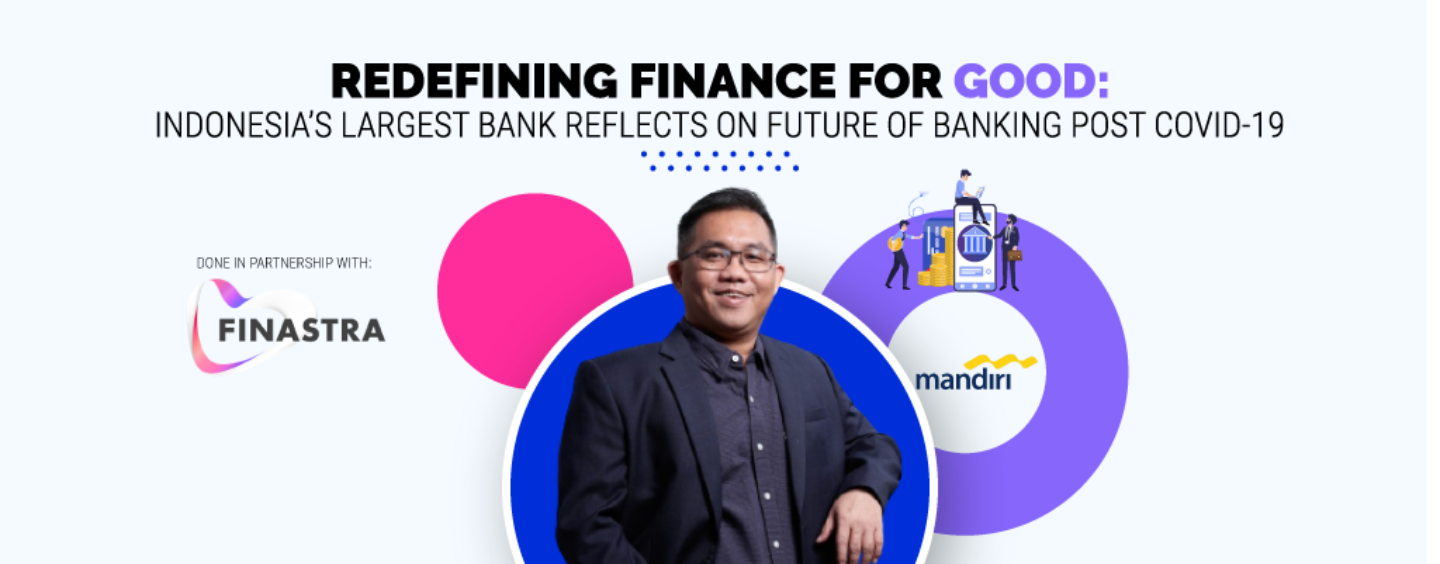
Redefining Finance for Good: Indonesia’s Largest Bank Reflects on the Future of Banking
by Fintech News Indonesia September 28, 2020COVID-19 has been an important catalyst for digital transformation across all industries. In banking, the pandemic has accelerated banks’ digitalization push and triggered a sharp rise in digital payments and digital banking usage.
In partnership with Finastra, the Fintech News Network is running a series of interviews with the industry’s top banking voices to understand how their organizations have responded to these changes.
As part of the “Redefining Finance for Good” series, we spoke to Rico Usthavia Frans, IT and operations director at Bank Mandiri, the largest bank in Indonesia in terms of assets, loans and deposits, on how the financial institution has addressed customers’ new expectations and behaviors that stemmed from the COVID-19 pandemic.
Accelerating digitalization

COVID-19 has had a major impact on the Indonesian economy, pushing the government to implement social distancing regulations and forcing nearly all public places to close down.
Against this backdrop, Bank Mandiri had to revamp its corporate plan and is now focusing on becoming “a modern retail digital bank in Indonesia” by not only developing its digital offerings but also leveraging its subsidiaries and third-party digital ecosystem, Rico told the Fintech News Network.
“The occurrence of the COVID-19 pandemic forces us to speed up some of the digitalization initiatives that we have had in our plan,” he said. Earlier this month, Rico said that Bank Mandiri had allocated Rp 1.7 trillion (US$114.42 million) for its IT capital expenditure this year.
Changing customer behaviors

Amid COVID-19, Bank Mandiri had to close almost half of its branches all around Indonesia, and restructure loans for 9% of its loan customers, with the most impacted segments being micro, small and medium-sized enterprises (MSMEs), Rico said.
“Conventional channels [such as branch, electronic data capture (EDC) systems, and ATMs], have shown more than 30% decrease on the number of transactions during the pandemic,” Rico said. Though the bank has seen a rebound in offline operations since July, a considerable chunk of transactions have definitely moved online.
“The increase of transaction frequency in our digital channel has increased by almost 20-30% in the first half of 2020,” he said. “This pandemic is forcing the transition towards digital to all companies across many industries including ours.
“We believe that the changes in customer behavior due to this pandemic will become the new normal in the banking industry – although some of the banks may go back to old normal.”
Facilitating digital banking

Bank Mandiri has launched several initiatives to help customers transition to this new era of banking and facilitate digital banking. These include expanding its capacity of its online account opening services, enabling the activation of mobile banking services via its call center and ATMs instead of having to visit a branch, as well as equipping relationship managers with new tools to simplify the loan application process.
The bank has also improved the delivery time for microloans, and partnered with third-parties including e-commerce platforms such as Bukalapak to provide seller financing.
This month, Bank Mandiri started providing open banking application programming interface (API) services to third-parties, allowing them to integrate their businesses with the bank. Rico said at the time that the bank had teamed up with 100 e-commerce, fintech and startups with its API portal, and was hoping to reach 150 partners by the end of the year.
The post-COVID-19 world
Moving forward, Rico believes remote and contactless transactions will become the new normal. “Many banking branches might be transformed into digital branches aside from the digital channel to help the customer transition from conventional branches,” he said. “As more and more digital services are being developed post-pandemic, not only by banks but also by many fintech players, digital banking’s future is much bigger than just transforming digitally.
“Banks need to go beyond transactional banking and more into digitally-driven relationship-based banking with the customers.”
“Our digital initiatives will not stop here, as there are more digital products and services waiting on the pipeline within this year and years after, not only to answer the crisis but also to provide more convenience to all of our customers facing the new normal,” Rico concluded.
This is part of our ongoing series of Redefining Finance for Good in partnership with Finastra, check out our other interviews with the industry’s top voices:
- Redefining Finance for Good: How DBS Responded to the Pandemic with Jeremy Soo, Head of Consumer Banking at DBS Bank
- Redefining Finance for Good: How the Pandemic Fast Tracked CIMB’s Digital Initiatives, with Samir Gupta, CEO of Group Consumer Banking at CIMB Group
- Redefining Finance For Good: Serving Asia’s 1 Billion Unbanked, with Wissam Khoury, Head of International, Finastra





